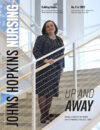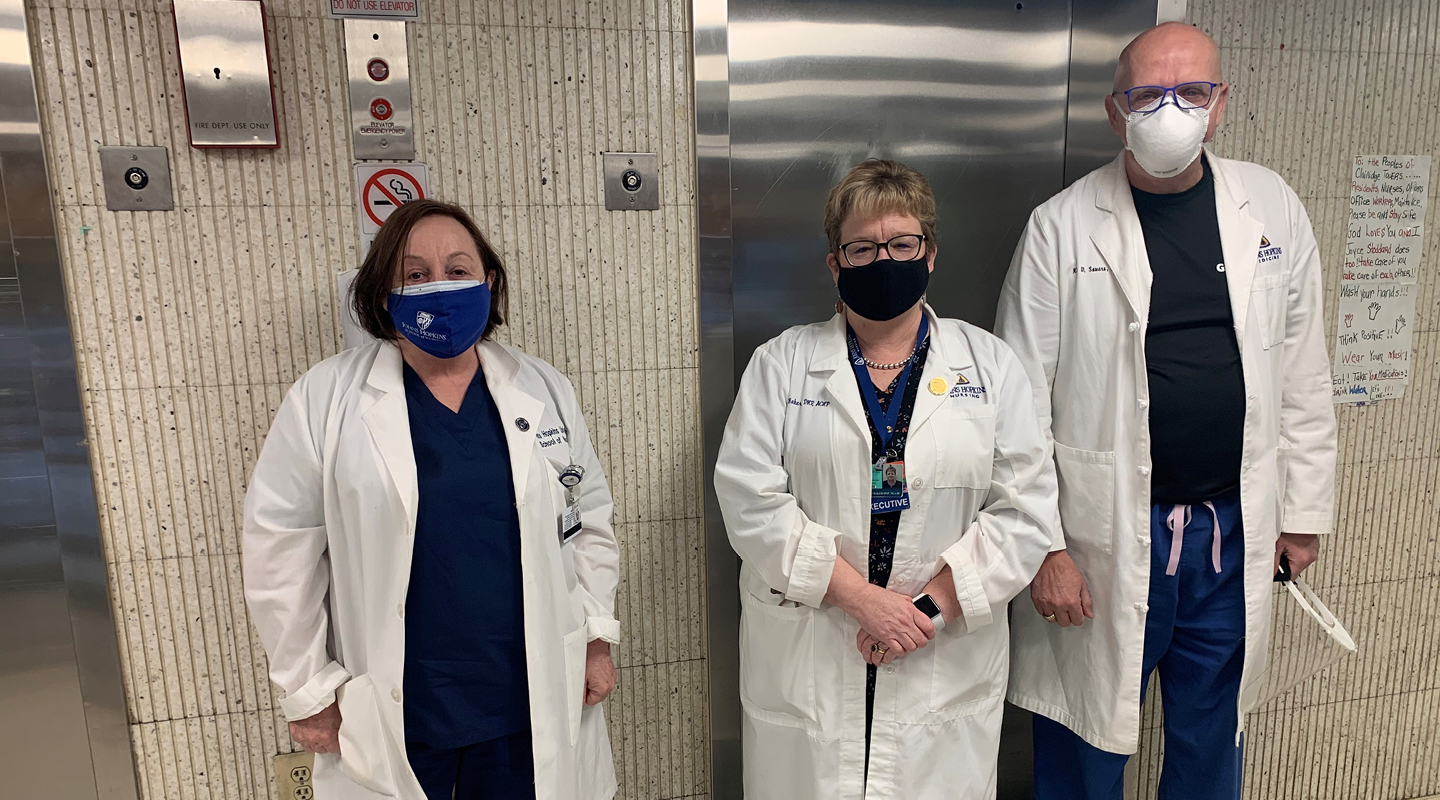Hope Springs Eternal Across Johns Hopkins Nursing
By Deborah Baker
It is hard to believe that we have been in the midst of the COVID-19 pandemic for over a year. In some ways it feels like so much longer; in others like the time has gone by unbelievably fast. It seems an eternity since we last ate inside restaurants or hugged a friend outside of our “bubble.” Yet, the speed of change we have experienced as nurses and throughout the health care industry in the past year has been nothing short of incredible. There are numerous examples of these points of pride in which nurses designed and have led novel approaches to care.
Prior to the pandemic, I remember feeling so proud that the World Health Organization had designated 2020 as the International Year of the Nurse and Midwife and excited for the long-deserved recognition. Then, none of us could have imagined the incredible spotlight that would be shone on our profession due to COVID-19. Nurses at Johns Hopkins and across the globe have played an indispensable role fighting for the health of their patients and to stay safe while battling this virus. And it is an honor that the International Year of the Nurse and Midwife has been extended through 2021.
As nurses, we have been on the frontlines of this pandemic since Day One. Every nurse at Johns Hopkins has contributed to the complex and multidisciplinary efforts to implement a safe environment for COVID and non-COVID care.
Nurses on COVID-designated units like Nelson 5 at The Johns Hopkins Hospital, an immediate care unit among the first at hospital to care for COVID patients, had to quickly learn new skills, procedures, and workflows—and directions: new walls built to maintain negative pressure; the latest safety protocols; how to properly don and doff personal protective equipment (PPE). When ICU beds throughout the hospital started to fill up, these nurses rose up, partnering with nurses from other ICUs to care for these critically ill COVID patients and gradually being upskilled with the training and knowledge to care for ICU-level patients themselves.
At Sibley Memorial Hospital, medical/surgical Unit 7B has been the hospital’s COVID-designated unit. Recently, as the number of COVID patients at the hospital has dropped (fingers crossed), nurses on 7B have begun to care for COVID patients across all levels of care, not just the most critically ill.
Elsewhere, nurses have taken on new roles, developed new processes, and done whatever was needed to respond to the challenges we were facing. As COVID patients filled our hospital beds, nurses in the Johns Hopkins Children Center stepped up to care for adult patients. Johns Hopkins Hospital nurses led the creation of a “prone team” to respond to coronavirus patients in crisis, placing them on their stomachs to relieve pressure on the lungs. When elective procedures were canceled out of an abundance of caution, operating room and other procedural area nurses were redeployed to areas of need. Nurses served as safety officers, ensuring staff were wearing proper PPE to follow evolving safety protocols.
Nurses designed and ran testing tents throughout the heat of the summer and chill of the winter. At Johns Hopkins Bayview Medical Center, care teams repurposed its community “Care-a-Van,” a free, mobile medical unit, as a drive-through COVID-19 testing site, one of the first in the area. As of February 2021, the unit had conducted more than 25,000 tests in the community.
Nurses helped set up mobile clinics to care for the most underserved and high-risk populations in area senior housing facilities. And they were a part of “Go Teams” deployed to nursing homes, shelters, and other areas to provide COVID testing to vulnerable populations. Some locations they visited had positivity rates above 50 percent, yet they went willingly.
These are just some examples of the countless ways nurses across the Johns Hopkins Health System have stepped up to confront a largely unknown adversary with bravery, strength, humility, and humanity. We have been the mothers, brothers, fathers, sisters, friends at the side of a patient’s bed when their own loved ones could not be there. We have adapted and persevered, as that is what Johns Hopkins Nurses do.
Now we are finally starting to see the light on the other side of a seemingly endless tunnel. It would have been nearly impossible to imagine, this time last year, that we would be deploying nurses to work in COVID-19 vaccination clinics and that many of us would ourselves be fully vaccinated. Recently, I spent a weekend with JHSON Dean Patricia Davidson and Kevin Sowers, president of the Johns Hopkins Health System, administering vaccinations at a clinic in Washington, DC for homebound patients. I can honestly say that it was the most meaningful thing I have done in the past year. So many Johns Hopkins Nurses can match that.
As we enter spring, a time of renewal and growth, I am filled with a sense of hope for what our future holds. We have been tested and continue to rise to the challenges. While we are not at the finish line yet, it is visible in the distance.
“Caring for Ourselves and Each Other” is the theme of our Nurses Week celebrations this year, a change to recommit to our personal and communal health. I hope all nurses are able to take time to focus on their own health and resilience as we emerge from the difficulties of the past year. I am so grateful for every Johns Hopkins Nurse who, despite the fear, sacrifice, and loss experienced this year, never gave up on our patients or each other. Thank you for your strength, courage, and dedication. And thank you for being a Johns Hopkins Nurse.
Deborah Baker, DNP, RN, NEA-BC, is senior vice president for nursing for the Johns Hopkins Health System. She also serves as vice president of nursing and patient care services for The Johns Hopkins Hospital.

